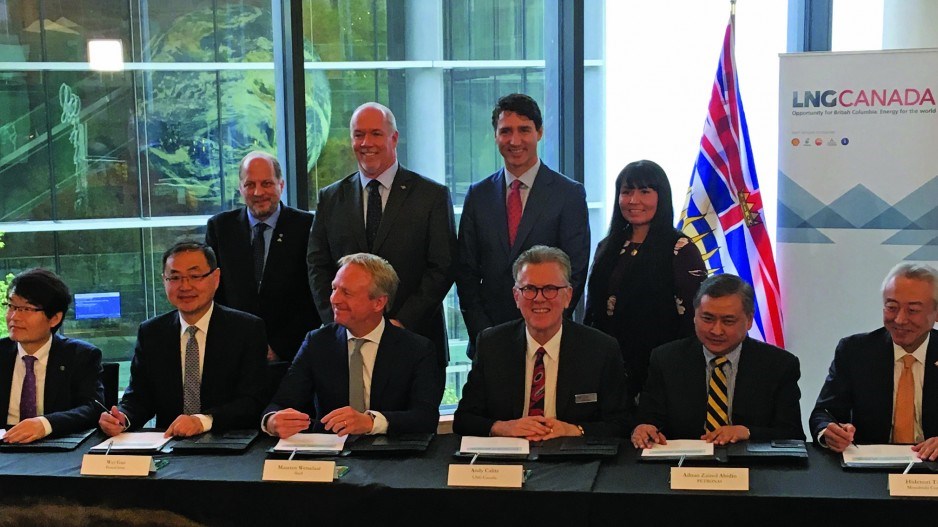“Today’s announcement by LNG Canada represents the single largest private-sector investment in the history of Canada.”
So said Prime Minister Justin Trudeau October 3 at the official signing of an “unconditional” final investment decision on the $40 billion project by the five joint venture partners.
“Today, LNG Canada has sent the signal to the people of the world that British Columbia and Canada are open for business,” said Premier John Horgan, who credited some of his BC Liberal predecessors, including former natural gas minister Rich Coleman, for helping position B.C. as a producer of liquefied natural gas (LNG).
Site preparation work on a $14 billion LNG plant in Kitimat is already underway. Construction of the associated $6.2 billion, 670-kilometre Coastal GasLink natural gas pipeline is slated to begin in early 2019.
The joint venture is aiming for the new plant to be in production by 2025, when global demand for LNG is expected to be on the rise.
Between now and then, LNG Canada will spend $23 billion in B.C., and an estimated 10,000 workers will be employed on the plant and pipeline, which will bring natural gas from the Dawson Creek area to Kitimat.
Some of those workers will come from First Nations, which have played a critical role in supporting the project. All First Nations along the pipeline corridor have signed agreements estimated to be worth $1 billion in benefits, including jobs and contracts.
Business groups and organized labour hailed the project’s sanctioning – coming as it did within hours of a renewed North American free-trade agreement – as a much-needed positive signal to international investors that, despite a series of other projects being cancelled or delayed, large energy projects can be built in Canada.
“What we have just seen may go down as one of the best weekends in B.C.’s economic history,” said Chris Gardner, president of the Independent Contractors and Businesses Association.
In a rare show of non-partisan unity, Liberals and New Democrats have come together in support of the LNG Canada project. Only the BC Green Party stands opposed.
The project has also brought Trudeau and Horgan together at a time when they have been at odds over another major energy project – the $7.4 billion Trans Mountain pipeline expansion project, which Horgan has been trying to kill.
To get to a final investment decision, the provincial government promised to scrap $5.4 billion worth of special LNG taxes introduced by the previous Liberal government under Christy Clark.
The BC NDP government now plans to tax the LNG industry at the same rates it applies to other heavy industries. It estimates provincial revenues from natural gas royalties, income and other taxes will be $24 billion over 40 years.
The federal government is also offering $275 million in incentives in the form of infrastructure spending in communities like Kitimat.
Ottawa has also given assurances that the project will be exempted from 45% tariffs on imported prefabricated steel products, which would have added hundreds of millions to the cost of LNG modules that will be built in Asia.
LNG Canada is a joint venture involving five major international players in the energy sector: Royal Dutch Shell (NYSE:RDS.A), Petronas, PetroChina, Mitsubishi Corp. and Korea Gas Corp. (Kogas).
“The joint venture companies with you today have extensive LNG project experience and deep knowledge of the Asian markets,” said Maarten Wetselaar, Shell’s director of integrated gas and new energies.
Access to abundant low-cost gas in northeastern B.C. and a short, 10-day shipping route to Asia (compared with 24 days from the U.S. Gulf Coast) make the project’s economics attractive, Wetselaar said.
Environmental groups – including the Pembina Institute, David Suzuki Foundation and Sierra Club – have expressed dismay over the federal and provincial governments’ support for the project, saying it will make it difficult, if not impossible, for them to fulfil their commitments to reducing greenhouse gases.
But Trudeau said the bigger picture is that the project will have a net benefit, because LNG exports will help some Asian countries reduce their reliance on coal power.
“LNG Canada will have the lowest carbon intensity of any large LNG facility in the world,” Trudeau said. “By sending Canadian LNG to markets that are today powered by coal, we will help those jurisdictions transition away from this energy source.”
See related story, Weighing LNG Canada's environmental pros an cons
@nbennett_biv




